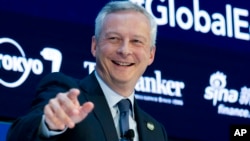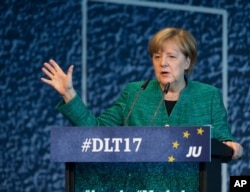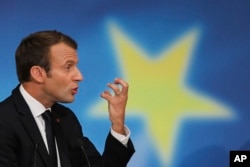Visiting Berlin in the midst of sensitive coalition talks, French Finance Minister Bruno Le Maire urged Germany to seize a historic window of opportunity to reform Europe, warning that the bloc could succumb to nationalism if they failed.
The visit comes six weeks after a German election forced Chancellor Angela Merkel into negotiations with parties, including the Free Democrats (FDP), that are sceptical of French President Emmanuel Macron's ambitious vision for Europe.
By holding talks with leading members of those parties, including FDP leader Christian Lindner, Le Maire said he hoped to convince members of the next German government to leave the door open to a European deal with France as they hammer out a coalition blueprint for the next four years.
“We are of the view that there is a unique window of opportunity to improve the situation and make the eurozone stronger,” Le Maire said.
“I hope that they will take into account the necessity to
preserve a room of maneuver for negotiation,” he added.
“Because if everything is already decided in the German coalition agreement, what should we negotiate? This is one of the key reasons for my trip to Berlin.”
After nearly a decade of economic and financial crisis, and following Britain’s decision to leave the EU, Macron is pushing for a leap forward in European integration, including the creation of a budget for the eurozone and closer cooperation in defense and migration matters.
Merkel has welcomed many of his ideas, but members of her own conservative bloc and the FDP are sceptical, particularly on French plans for the eurozone, fearing Germany will be asked to pay for the policy failures of reform-wary southern states.
Europe faces choice
Speaking to reporters after meeting with Lindner, Le Maire said he believed that the differences could be overcome.
“None of the difficulties are insurmountable. I found a man who is conscious of his political responsibilities, conscious of his historic responsibilities,” he said.
Earlier in a speech to a Franco-German business forum, Le Maire likened the current situation in the eurozone to standing in the middle of a strong-flowing river where the currents were most dangerous.
He said Europe faced a choice: turn back to the shore from where they came, embracing nationalism and isolation, or say “now is the time” and press on to the opposite bank by pursuing closer integration of the eurozone.
“That status quo is not an option,” Le Maire said.
He spelled out four steps for a reform of the 19-nation single currency bloc. In the first, Europe would complete its banking union, capital markets union and harmonise its tax regimes, particularly in the area of corporate taxes.
Second, Europe would bolster its rescue fund, the European Stability Mechanism (ESM), and third, it would introduce a budget for the eurozone to fund investments in areas such as transport, energy and artificial intelligence, and help the bloc cope with economic shocks.
In a last step, member states could appoint a finance minister for the eurozone, he said.
Switching between fluent German and French, Le Maire said Franco-German working groups should be created to discuss reform on a “weekly or even daily basis.” He said other countries should be brought into the process, naming Spain and Italy.
In his speech to the business forum, Le Maire urged the bloc to unite in pushing back against powers like China and the United States that he said were determined to shape the world according to their national interests.
German politicians have been sceptical of Macron's “l’Europe qui protege” (Europe that protects) pledge, fearful of a return to old-fashioned French protectionism.
But Le Maire said Europe should no longer be “naive” in the face of economic challenges from abroad, accusing the Chinese of killing off the European solar panel industry and the Americans of using extra-territorial sanctions to shape global trade rules in their favor.
“Europe needs to stop being scared of its own shadow,” Le Maire said. “Divided we are nothing. Together we are everything.”







